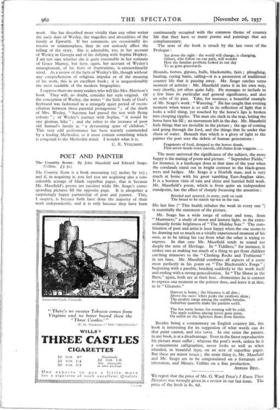POET AND PAINTER The Country Scene. By John Masefield and
Edward Seago. (Collins. £3 3s.) The Country Scene is a book measuring 521 inches by toe ; and if, in acquiring it, you feel you are acquiring also a con- siderable acreage of blank superfine paper, that is because Mr. Masefield's poems are succinct while Mr. Seago's corre- sponding pictures fill the opposite page. It is altogether a surprisingly happy partnership of poet and painter. This, I suspect, is because both have done the majority of their work independently, and it is only because they have been
continuously occupied with the common theme of country life that they have so many poems and paintings that are complementary.
The note of the book is struck by the last verse of the Prologue :
Set down the sight : the world will change, is changing, Others, who follow on our path, will wonder How the familiar problem looked in our day To us gone grasswards.
Hounds, horses, gipsies, bulls, blacksmiths, fairs ; ploughing, hauling, curing hams, sailing—it is a procession of traditional
country life that is passing away. Mr. Seago catches some moment of activity : Mr. Masefield states it in his own way,
very shortly, yet often quite fully. He manages to include in a few lines its particular and general significance, and also an echo of its past. Take, for instance, a beautiful example of Mr. Seago's work : " Watering." He has caught that evening moment when water is so still in its reflection of light that it looks a solid thing, yet touched by the horse's lips is broken into creeping ripples. The man sits slack in the trap, letting the horse have his fill ; no movement left in the day. Mr. Masefield feels things that are invisible in the picture ; the age of coming and going through the ford, and the things that lie under that sheen of water. Beneath that which is a glory of light to the painter the poet sees the debris of human generations : Fragments of food, dropped as the horses drank, Flint arrow-heads worn smooth, old chains from waggons .
The more universal the significance of the subject, the more happy is the mating of poem and picture. " September Fields," for instance, is a landscape done at that time of the year when the cortilands stand out in bright contrast to the black-green trees and hedges. Mr. Seago is a Norfolk man, and is very
much at home with his great tumbling East-Anglian skies.
It is a horizon vista of rain and shine and hurried field work. Mr. Masefield's poem, which is from quite an independent standpoint, has the effect of sharply focussing the attention :
Bristled and speared, in army, rank on rank The bread to be stands tip-toe in the sun.
His last line (" This health rebukes the weak in every one ") is essentially the statement of the picture.
Mr. Seago has a wide range of colour and tone, from " Mummers," a study of moon and lantern light, to the extra- ordinarily fertile brightness of " The Midday Sun." The com- bination of poet and artist is least happy when the one seems to be drawing not so much on a vividly experienced moment of his own, as to be taking his cue from what the other is trying to express. In that case Mr. Masefield tends to sound too deeply the note of Heritage. In " Tiddlers," for instance, it strikes one as making too much of a thing to get from children catching minnows to the " Clashing Rocks and Trebizond " in ten lines. Mr. Masefield combines all aspects of a scene most perfectly in his poem on " The Blacksmith's Forge " ; beginning with a parable, bending suddenly to the work itself and ending with a strong generalisation. In " The Horse in the Barn," again, both are at their best. -Sometimes he is content to express one moment as the painter does, and leave it at.that, as in " Gleaners."
Harvest is home ; the blueness is all dim ; Above the oasts' white peaks the swallows skim ; The poultry range among the stubble-bristles. Suburban quarrels make the partlets scold.
The bee turns home, for evening will be cold. The apple reddens among leaves gone prim, On unfelt air the lightness floats from thistles.
Besides being a commentary on English country life, this book is interesting for its suggestion of what words can do
that paint cannot, and vice versa. In one sense the painter, in any book, is at a disadvantage. Even in the finest reproduction
his picture must suffer ; whereas the poet's work, unless he is a consummate calligraphist, never looks so well as when islanded, in beautiful type, on an acre of superfine paper.
But these are minor issues ; the main thing is, Mr. Masefield
and Mr. Seago are to be congratulated on .a fortunate col- laboration, and Messrs. Collins on a fine production.
ADRIAN BELL.














































 Previous page
Previous page